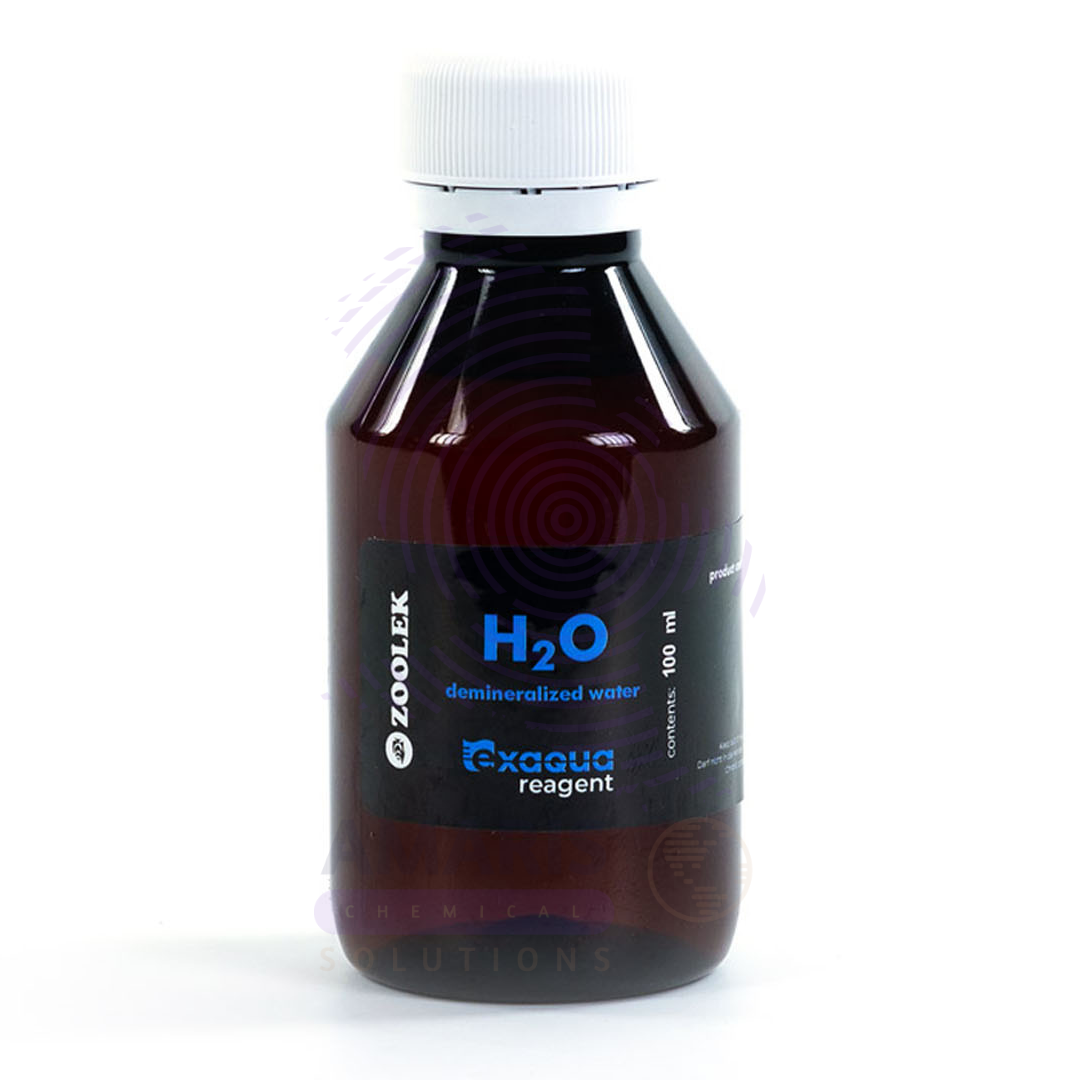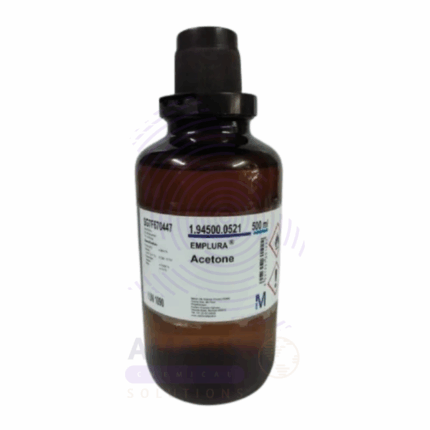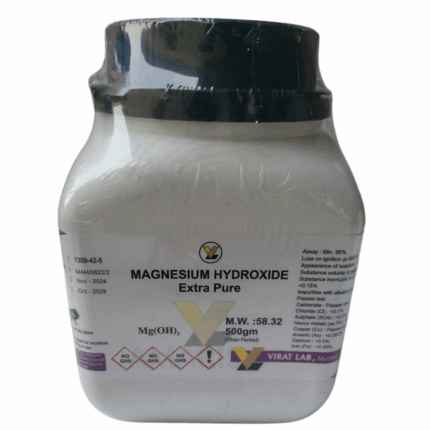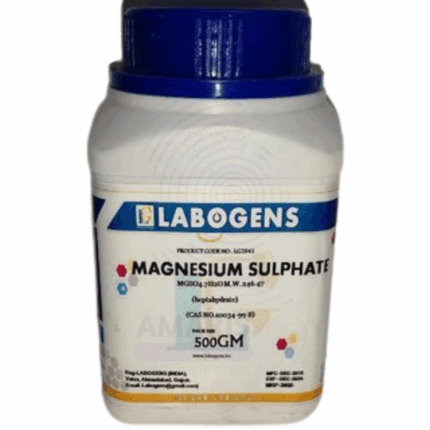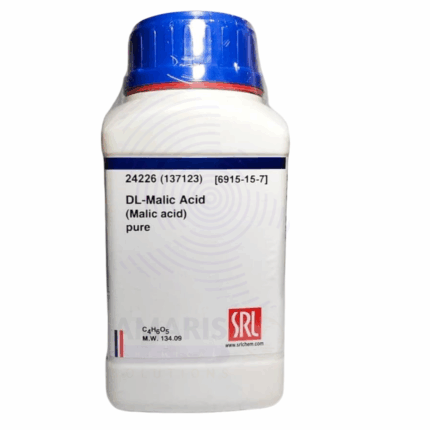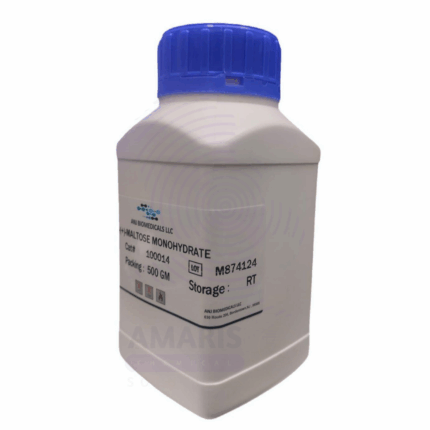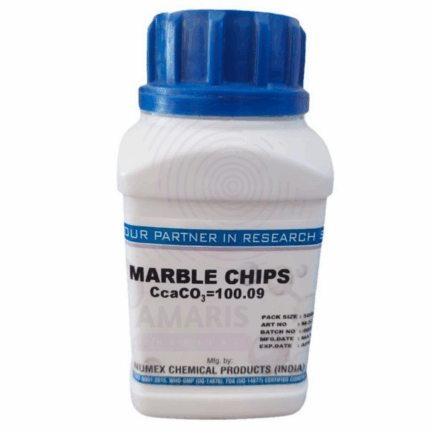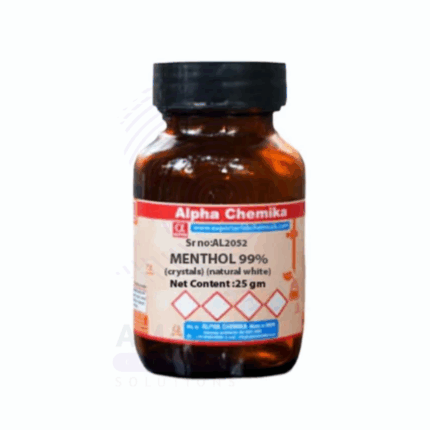“Magnesium Carbonate Heavy Extra Pure” has been added to your cart. View cart
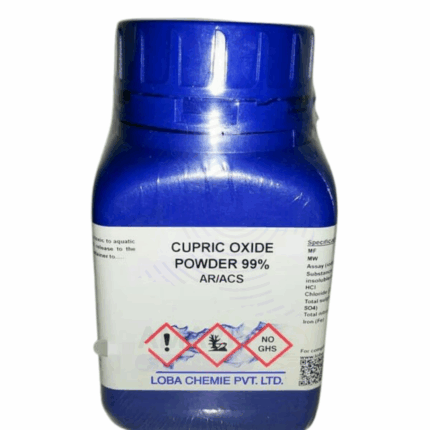
Cupric Oxide Extra Pure
$ 22.30 Original price was: $ 22.30.$ 22.10Current price is: $ 22.10.
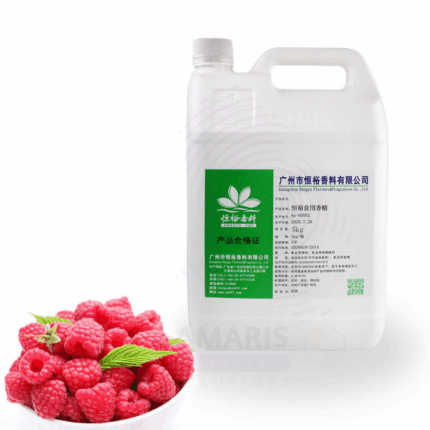
Raspberry Liquid Flavour Food Grade
$ 39.00 Original price was: $ 39.00.$ 38.67Current price is: $ 38.67.
Deionized Water Extra Pure
$ 6.70 Original price was: $ 6.70.$ 6.59Current price is: $ 6.59.
Whatsapp Order
Deionized Water Extra Pure is ultra-purified water that has had all mineral ions, such as sodium, calcium, iron, chloride, and sulfate, removed through ion-exchange processes. It is widely used in laboratories as a solvent, reagent diluent, and cleaning agent for sensitive instruments, ensuring no interference from dissolved ions in chemical analyses or reactions. This extra pure grade guarantees extremely low conductivity and minimal contaminants, making it ideal for analytical procedures, biological experiments, and preparation of standard solutions. It should be stored in clean, non-leaching containers to maintain its purity and prevent recontamination.
Description
Table of Contents
Toggle
Deionized Water Extra Pure
Primary Uses
- Solvent for Sensitive Reactions
- Ideal for reactions that require minimal ionic contamination, especially those involving precipitation, titration, or synthesis.
- Solution & Reagent Preparation
- Used to prepare accurate concentrations of analytical reagents, standards, and buffers due to its high purity and predictable conductivity.
- Glassware Rinsing & Cleaning
- Final rinse water in analytical labs to prevent ion residues from tap water that could interfere with measurements.
- Instrument Feed Water
- Essential in AAS, HPLC, GC-MS, ICP, and spectrophotometers to avoid signal interference and clogging due to dissolved salts.
Secondary Uses
- Microbiology & Cell Culture Media
- Used in combination with sterile techniques to avoid contamination with metal ions or chlorine that affect microbial growth.
- Battery Electrolyte & Calibration
- Acts as a base for electrolyte preparation or calibration of pH meters and conductivity probes.
- Photographic & Optical Work
- Prevents mineral deposits on lenses, films, or sensitive optical instruments.
Additional information
| PACK SIZE |
20ltrs |
|---|
KEY PRODUCT FEATURES
1. Basic Identification Attributes
- Chemical Name: Deionized Water
- Common Name: DI Water / Demineralized Water
- CAS Number: 7732-18-5
- Chemical Formula: H₂O
- Grade: Extra Pure (Laboratory Grade, free from ionic contaminants)
2. Physical & Chemical Properties
- Appearance: Clear, colorless, odorless liquid
- Solubility: Completely miscible with most solvents
- pH: Typically between 5.5 – 7.5 (due to CO₂ absorption)
- Conductivity: <1 µS/cm (ultrapure), depending on production quality
- Boiling Point: 100 °C
- Freezing Point: 0 °C
- Density: 1.000 g/cm³ at 4 °C
3. Safety & Hazard Attributes
- GHS Classification: Not classified as hazardous
- NFPA Ratings:
- Health: 0
- Flammability: 0
- Reactivity: 0
- First Aid Measures:
- Inhalation / Skin / Eye / Ingestion: No adverse effects under normal conditions
4. Storage & Handling Attributes
- Storage Conditions:
- Store in tightly sealed containers
- Avoid contamination—use clean, inert, or sterilized containers
- Best stored in glass or high-grade plastic containers (e.g., HDPE, PP, PTFE)
- Handling Advice:
- Avoid contact with reactive chemicals that could leach into water
- Prevent exposure to air if CO₂-sensitive applications require ultra-low conductivity
5. Regulatory & Compliance Attributes
- EINECS Number: 231-791-2
- UN Number: Not regulated
- REACH Status: Exempt (naturally occurring substance)
6. Applications in Laboratory
- Primary Use:
- Essential solvent and diluent in most analytical and preparative procedures
- Other Uses:
- Preparation of standards, reagents, buffers, and media
- Rinsing and cleaning of glassware to avoid contamination
- Feedwater for laboratory instruments (HPLC, AAS, ICP-MS, etc.)
- Electrochemistry and pH measurements
- Molecular biology and microbiology applications
- Cooling and autoclaving processes
SAFETY HANDLING PRECAUTIONS
SAFETY PRECAUTIONS
- PPE: Typically minimal, but for sensitive labs:
- Gloves (to prevent contamination)
- Clean lab attire
- Use clean, sterile containers to avoid recontamination
- Handling Notes:
- Use only with dedicated containers to avoid ionic leaching or contamination
- Do not expose to air for extended periods—can absorb CO₂, affecting pH
- Storage Conditions:
- Store in high-density polyethylene (HDPE) or borosilicate glass
- Keep tightly sealed in a clean, dry environment
- Protect from dust and environmental contaminants
FIRST AID MEASURES
- Generally non-toxic and safe
- In case of accidental contamination with lab substances, treat based on the contaminant involved
FIREFIGHTING MEASURES
- Flammability: Non-flammable
- Fire hazard: None
Related products
Acetone Extra Pure
Acetone Extra Pure is a highly volatile, flammable, and colorless liquid widely used as a powerful solvent in laboratory and industrial applications. Known for its exceptional ability to dissolve a wide range of substances, it is commonly employed for cleaning laboratory glassware, thinning resins, and removing organic residues. In the cosmetics and pharmaceutical industries, acetone is used in nail polish removers and formulation processes. Its high evaporation rate and purity make it suitable for analytical procedures and synthesis work, especially where contaminant-free solvents are essential. With a distinct odor and low boiling point, Acetone Extra Pure is an indispensable reagent for both routine and specialized chemical operations.
Magnesium Hydroxide Heavy Extra Pure
Magnesium Hydroxide Heavy Extra Pure is a high-purity, dense white powder widely utilized for its antacid and absorbent properties. In pharmaceutical formulations, it acts as a gentle laxative and an effective antacid to neutralize stomach acid. Due to its high purity, it is also used in laboratory experiments and analytical chemistry where precise reactions are essential. In cosmetic and personal care products, it functions as a pH adjuster and an absorbent in creams, lotions, and deodorants. Additionally, it serves roles in wastewater treatment, flame retardants, and ceramic manufacturing, offering consistent performance and low impurity content.
Magnesium Sulphate Extra Pure
$ 17.20
Magnesium Sulphate Extra Pure is a high-purity, inorganic compound commonly appearing as a white crystalline powder or granules. It is primarily valued in laboratories for its role as a source of magnesium ions in chemical analysis and biological experiments. This compound is widely used in buffer preparation, dehydration processes, and precipitation reactions due to its excellent solubility in water. In addition to lab applications, it also serves purposes in pharmaceutical formulations, cosmetics, and agriculture as a magnesium supplement. Its extra pure grade ensures minimal impurities, making it suitable for sensitive research and analytical tasks.
Malic Acid Extra Pure
Malic Acid Extra Pure is a high-grade, naturally occurring dicarboxylic acid known for its sharp, tart flavor and versatility in both laboratory and industrial settings. It is commonly found in fruits such as apples and is widely used as an acidulant in food and beverage formulations, where it enhances flavor, preserves freshness, and improves pH stability. In laboratory applications, Malic Acid is employed in biochemical research, particularly in studies involving the citric acid cycle, due to its role as an intermediate metabolite. Its excellent solubility in water and mild acidity also make it suitable for cosmetic formulations and pharmaceutical preparations. The extra pure grade ensures high analytical accuracy and consistent quality across applications requiring strict purity standards.
Maltose Extra Pure
Maltose Extra Pure is a disaccharide composed of two glucose units, commonly known as malt sugar. This extra pure grade ensures exceptional quality and consistency, making it ideal for use in biochemical research, fermentation studies, and laboratory analysis. In the food industry, maltose is valued for its mild sweetness and is often used in brewing, baking, and confectionery to promote fermentation and enhance flavor. It also plays a role in energy metabolism studies and is frequently used as a carbon source in microbiological media. Its stability and solubility in water make it easy to incorporate into various formulations, offering a dependable ingredient for scientific and industrial use where high purity is essential.
Marble Chips Extra Pure
Marble Chips Extra Pure are high-grade, naturally occurring calcium carbonate fragments that have been carefully processed to ensure exceptional purity. These white or off-white chips are widely used in laboratory experiments, especially in demonstrations involving acid-carbonate reactions where the release of carbon dioxide is observed. Beyond educational and research use, they also serve as a buffering agent, filtration medium, and mild abrasive in various industrial applications. Due to their chemical stability and high calcium content, marble chips are ideal for use in controlled environments where contaminants must be minimized.
Menthol Crystals Extra Pure
Menthol Crystals Extra Pure are colorless to white, needle-like crystals derived from peppermint or other mint oils and refined to the highest purity. Known for their strong, refreshing minty aroma, they are widely used in pharmaceutical, cosmetic, and personal care formulations. These crystals provide a cooling sensation on the skin and mucous membranes, making them a common ingredient in balms, liniments, throat lozenges, and inhalants. In laboratories, menthol crystals are also used in sensory studies and product development. Their purity ensures consistent performance and minimal interference in sensitive formulations.
Methoxy Benzophenone Sulfonic Acid Extra Pure
Methoxy Benzophenone Sulfonic Acid Extra Pure is a high-purity, water-soluble organic compound primarily used as a UV filter in cosmetic and pharmaceutical formulations. This compound is valued for its ability to absorb harmful ultraviolet radiation, particularly in the UVB range, making it a key ingredient in sunscreens, lotions, and other personal care products requiring photo-stability. In laboratory settings, it is employed in research involving photochemistry and polymer stabilization. Its sulfonic acid group enhances water solubility, while the methoxy and benzophenone components provide strong UV-absorbing characteristics, ensuring effective and consistent performance in formulations demanding high safety and efficacy standards.


 Preservatives(food)
Preservatives(food) Flavor Enhancers
Flavor Enhancers Acidulants
Acidulants Sweeteners
Sweeteners Antioxidants
Antioxidants Colorants(food)
Colorants(food) Nutraceutical Ingredients (food)
Nutraceutical Ingredients (food) Nutrient Supplements
Nutrient Supplements Emulsifiers
Emulsifiers
 Collectors
Collectors Dust Suppressants
Dust Suppressants Explosives and Blasting Agents
Explosives and Blasting Agents Flocculants and Coagulants
Flocculants and Coagulants Frothers
Frothers Leaching Agents
Leaching Agents pH Modifiers
pH Modifiers Precious Metal Extraction Agents
Precious Metal Extraction Agents
 Antioxidants(plastic)
Antioxidants(plastic) Colorants (Pigments, Dyes)
Colorants (Pigments, Dyes) Fillers and Reinforcements
Fillers and Reinforcements Flame Retardants
Flame Retardants Monomers
Monomers Plasticizers
Plasticizers Polymerization Initiators
Polymerization Initiators Stabilizers (UV, Heat)
Stabilizers (UV, Heat)
 Antifoaming Agents
Antifoaming Agents Chelating Agents
Chelating Agents Coagulants and Flocculants
Coagulants and Flocculants Corrosion Inhibitors
Corrosion Inhibitors Disinfectants and Biocides
Disinfectants and Biocides Oxidizing Agents
Oxidizing Agents pH Adjusters
pH Adjusters Scale Inhibitors( water)
Scale Inhibitors( water)
 Antioxidants(cosmetic)
Antioxidants(cosmetic) Emollients
Emollients Fragrances and Essential Oils
Fragrances and Essential Oils Humectants
Humectants Preservatives
Preservatives Surfactants(cosmetic)
Surfactants(cosmetic) Thickeners
Thickeners UV Filters
UV Filters
 Fertilizers
Fertilizers Soil Conditioners
Soil Conditioners Plant Growth Regulators
Plant Growth Regulators Animal Feed Additives
Animal Feed Additives Biostimulants
Biostimulants Pesticides (Herbicides, Insecticides, Fungicides)
Pesticides (Herbicides, Insecticides, Fungicides)
 Active Pharmaceutical Ingredients (APIs)
Active Pharmaceutical Ingredients (APIs) Excipients
Excipients Solvents(pharmaceutical)
Solvents(pharmaceutical) Antibiotics
Antibiotics Antiseptics and Disinfectants
Antiseptics and Disinfectants Vaccine Adjuvants
Vaccine Adjuvants Nutraceutical Ingredients (pharmaceutical)
Nutraceutical Ingredients (pharmaceutical) Analgesics & Antipyretics
Analgesics & Antipyretics
 Analytical Reagents
Analytical Reagents Solvents(lab)
Solvents(lab) Chromatography Chemicals
Chromatography Chemicals Spectroscopy Reagents
Spectroscopy Reagents microbiology-and-cell-culture-reagents
microbiology-and-cell-culture-reagents Molecular Biology Reagents
Molecular Biology Reagents Biochemical Reagents
Biochemical Reagents Inorganic and Organic Standards
Inorganic and Organic Standards Laboratory Safety Chemicals
Laboratory Safety Chemicals Specialty Laboratory Chemicals(Special Laboratory Equipment)
Specialty Laboratory Chemicals(Special Laboratory Equipment)
 Demulsifiers
Demulsifiers Hydraulic Fracturing Fluids
Hydraulic Fracturing Fluids Scale Inhibitors(oil)
Scale Inhibitors(oil) Surfactants(oil)
Surfactants(oil) Drilling Fluids
Drilling Fluids
 Dyes and Pigments
Dyes and Pigments Bleaching Agents
Bleaching Agents Softening Agents
Softening Agents Finishing Agents
Finishing Agents Antistatic Agents
Antistatic Agents
 Admixtures
Admixtures Waterproofing Agents
Waterproofing Agents Sealants and Adhesives
Sealants and Adhesives Curing Compounds
Curing Compounds Concrete Repair Chemicals
Concrete Repair Chemicals Anti-Corrosion Coatings
Anti-Corrosion Coatings
 Surfactants(cleaning)
Surfactants(cleaning) Builders
Builders Enzymes
Enzymes Solvents (Cleaning)
Solvents (Cleaning) Fragrances
Fragrances
 Electronic Chemicals
Electronic Chemicals Catalysts
Catalysts Lubricants
Lubricants Photographic Chemicals
Photographic Chemicals Refrigerants
Refrigerants Automotive chemicals
Automotive chemicals Pyrotechnic Chemicals
Pyrotechnic Chemicals
 Biodegradable Surfactants
Biodegradable Surfactants Bio-based Solvents
Bio-based Solvents Renewable Polymers
Renewable Polymers Carbon Capture Chemicals
Carbon Capture Chemicals Wastewater Treatment Chemicals
Wastewater Treatment Chemicals
 Pigments
Pigments Solvents(paint)
Solvents(paint) Specialty Coatings
Specialty Coatings Binders/Resins
Binders/Resins Additives
Additives Driers
Driers Anti-Corrosion Agents
Anti-Corrosion Agents Functional Coatings
Functional Coatings Application-Specific Coatings
Application-Specific Coatings
 Fresh Herbs
Fresh Herbs Ground Spices
Ground Spices Whole Spices
Whole Spices Spice Blends
Spice Blends Dried Herbs
Dried Herbs
 Leavening Agents
Leavening Agents Dough Conditioners
Dough Conditioners Flour Treatments
Flour Treatments Fat Replacers
Fat Replacers Decoratives
Decoratives Preservatives(baking)
Preservatives(baking)
 Plasticizers & Softeners
Plasticizers & Softeners Reinforcing Agents
Reinforcing Agents Adhesion Promoters
Adhesion Promoters Vulcanizing Agents
Vulcanizing Agents Antidegradants
Antidegradants Blowing Agents
Blowing Agents Fillers & Extenders
Fillers & Extenders Accelerators & Retarders
Accelerators & Retarders